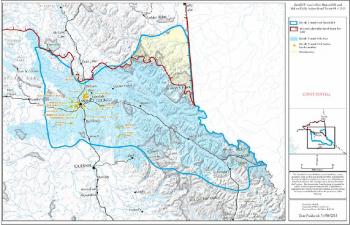Image Caption
By Shari Narine
Windspeaker Contributor
LHEIDLI T’ENNEH, B.C.
One British Columbia chief says that the province and federal government are pushing for the ratification of the Lheidli T’enneh treaty, despite concerns by some neighbouring First Nations about overlapping territories, because it is too good a deal for the Crown to pass on.
“I think British Columbia is pushing it because the deal is so cheap that their negotiators out-negotiated the Indians. And the deal is so cheap they have to get it signed so it doesn’t cost the Crown anything in terms of cash,” said Chief Harley Chingee of the McLeod Lake Indian Band.
The Lheidli T’enneh treaty, to be voted on by the First Nation in June, provides $37.1 million and 4,330 hectares of land if its 430 members ratify. In comparison, the treaty signed by the McLeod Lake Indian Band in 2000 provided 570 members 20,000 hectares and $1.3 billion net worth.
“(The Lheidli T’enneh) have got nothing and when you’re given 38 million bucks that’s a windfall. To us it’s not. Our trust is worth a couple hundred million dollars, so what’s $38 million when we’re talking $200 million?” said Chingee.
The Lheidli T’enneh treaty also includes one-time funding of $15 million for implementation, fisheries and capacity building and close to $2 million for an economic development fund. There is also annual funding of $502,000 per year for 50 years in resource revenue sharing; $100,000 annually for a community development officer; and, $2.29 million per year in ongoing funding for services such as health, education and social development, and for governance activities.
It’s not about the dollar figure, said Lheidli T’enneh Chief Dominic Frederick. “It’s about governance and how we’re going to govern ourselves and own our own lands and govern our own lands and our own people,” said Frederick.
The lands included in the Lheidli T’enneh treaty are being contested by the McLeod Lake Indian Band and the Simpcw First Nation.
“The territory (issue) we will continue to work on straightening our relations with our two neighbours, First Nations, but we will not stop the ratification,” said Frederick.
Both Chingee and Simpcw First Nation Chief Nathan Matthew are accusing the provincial and federal governments of not properly consulting with them and neither wants to be arguing the issue after the Lheidli T’enneh treaty has been ratified.
However, that is the process that is outlined in the Lheidli T’enneh final agreement. According to Indigenous and Northern Affairs Canada’s online summary, “Canada, British Columbia and Lheidli T'enneh are consulting with Lheidli T'enneh's neighbouring First Nations and will continue to work to resolve any remaining overlap issues. The harvesting areas set out in the Final Agreement are not exclusive, and other First Nations and the general public may fish and hunt there as they do now on provincial Crown land.”
Matthew is concerned by a recent BC Supreme Court decision, which dismissed a case of Gitanyow Hereditary Chiefs who were asking for more control of the moose management plans in areas overlapping territory given to Nisga’a First Nation through treaty.
“So we thought that our rights were protected against any of these treaty rights but, according to this, our reading of that case, they aren’t,” said Matthew.
Simpcw First Nation claims the Lheidli T’enneh treaty encroaches on ancestral lands spanning an area from McBride, B.C. to Jasper, Alberta, up to the 54th parallel and down just south of Valemount, B.C. Matthew is calling out Lheidli T’enneh for not presenting any historical evidence of living or hunting on those overlapping lands.
“Can a First Nation just go and claim any area they want in terms of the treaty process without having to justify where they put their boundaries?” said Matthew, who met with provincial and federal government representatives this past Monday.
“We’re looking for a firm commitment from them. I don’t know if we can stop the (membership) vote, but once the vote is taken, (for the governments) not to move into any kind of further ratification on their part … until we’ve settled our issues,” said Matthew.
According to Chingee, the Lheidli T’enneh treaty sees an overlap in territory that is already defined in the McLeod Lake Indian Band’s existing treaty and that, he says, gives his First Nation an advantage.
“Our (treaty) will be stronger because we have Canada and B.C. lawyers behind us, too,” said Chingee. “Our treaty is signed off by Order in Council by both governments. Nobody’s got that. We’ve got it.”
But Frederick claims that McLeod Lake Indian Band has been altering its maps to overlap land belonging to Lheidli T’enneh.
“We’re not looking for a fight with anybody. We’re good citizens. We don’t fight with anybody. We don’t roadblock people. But you know what? We’re going to do something for our community and our community needs to move ahead and fight for governance,” said Frederick.
B.C.’s Ministry of Indigenous Relations and Reconciliation was contacted by Windspeaker.com for comment, but it did not respond before deadline.

